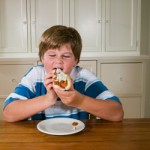Binge Eating or Overeating Disorder in Children
 There are times or functions at which there is a tendency of a child to eat as much as possible. A child may eat a dozen cookies during late night study during exam time. This does not represent some disorder in the child. In case the child is unable to control his habit of overeating and regularly overeats, he may be suffering from binge eating disorder. This disorder is treatable provided the child gets the right help at the right time.
There are times or functions at which there is a tendency of a child to eat as much as possible. A child may eat a dozen cookies during late night study during exam time. This does not represent some disorder in the child. In case the child is unable to control his habit of overeating and regularly overeats, he may be suffering from binge eating disorder. This disorder is treatable provided the child gets the right help at the right time.
Compulsive overeating symptoms
A person suffering from binge eating or disorder suffers from symptoms of compulsive overeating and consumes excessive quantity of food and is unable to stop himself from eating at all possible times. A binge eater will continue to eat even when not hungry and will repeat filling himself every two hours.
A binge eater often resorts to eating to overcome stress. We can take an example of the obese child being taunted by classmates. Such a child may turn towards food for comfort resulting in putting on more weight. Similarly a binge eater will resort to eating in case of bad result in class or if scolded by the teacher. The main features from which one can ascertain that the child is suffering from binge disorder are:
- Uncontrolled habit of eating by the child and consumption of large quantity of food especially when the child is alone. When in the company of others the child may behave in a normal.
- Tendency to eat even when full and throughout the day.
- After of before eating the child is upset or deeply distressed.
- There are no attempts by a binge eater to indulge in fasting or exercise to overcome effect of excess calories in body.
- Existence of feeling of guilt and depression in the mind of the child. He will feel like stopping binge eating but have a feeling that they cannot do it, resulting in depressed feeling.
Binge eating results in the child developing a variety of problems. These could be physical, emotional or social. Such children have more health related problems. They gain weight, have feeling of stress, insomnia and have suicidal tendency due to depression. The child may also develop high blood pressure, high cholesterol, joint pains or in extreme cases, heart disease.
It has been found that in addition to stress, there could be other reasons of binge eating. It could be possible that the part of the brain which controls appetite may not be working properly, resulting in incorrect message about a person being hungry or full.
Treatment and Prevention
The unhealthy practice of binge eating can be controlled in children but this will require a lot of effort and persuasion on the part of parents. The child should be given healthy and nutritious food and a daily diet chart should be drawn up. Some of the steps which will be helpful are:
- The important aspect of helping the child overcome this disorder is to find an alternate method of controlling stress in the child. Meditation and breathing exercises could be of great help to relieve the child of this unhealthy habit.
- Decide on the meal plan for the day. Do not make the child skip any meal as this will encourage him to eat something not in the plan. There should be three regular meals i.e. breakfast, lunch and dinner, with snack in between.
- Teach the child to avoid temptation towards food. Do not keep junk food or desserts in fridge or cupboards accessible to the child. This could be starting point of training the child.
- Do not force the child to diet as this could result in uncontrollable craving for food. If the child is overweight, try exercise or outdoor sports instead. Exercise and games will also help reduce tension and feeling of depression.
- Keep the child occupied so that he does not have feeling of boredom.
- Encourage the child to have enough sleep, this will help boost energy.
- Give maximum support to your child. You may give a diary to the child to keep track of what he eats. This will discourage the child when he himself finds about overeating or eating not scheduled.
In extreme cases the child may require medical or psychiatric treatment including administration of antidepressant medicines to break the repeated eating desire.